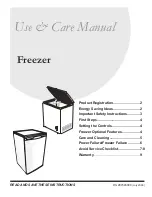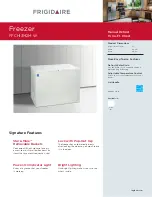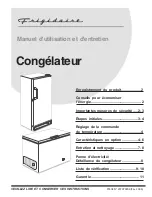
5.
CARE AND CLEANING
CAUTION!
Unplug the appliance before car-
rying out any maintenance opera-
tion.
This appliance contains hydrocar-
bons in its cooling unit; mainte-
nance and recharging must there-
fore only be carried out by author-
ized technicians.
5.1
Periodic cleaning
The equipment has to be cleaned regular-
ly:
• clean the inside and accessories with
lukewarm water and some neutral
soap.
• regularly check the door seals and wipe
clean to ensure they are clean and free
from debris.
• rinse and dry thoroughly.
Do not pull, move or damage any
pipes and/or cables inside the
cabinet.
Never use detergents, abrasive
powders, highly perfumed clean-
ing products or wax polishes to
clean the interior as this will dam-
age the surface and leave a
strong odor.
Clean the condenser (black grill) and the
compressor at the back of the appliance
with a brush. This operation will improve
the performance of the appliance and
save energy consumption.
Take care of not to damage the
cooling system.
When moving the cabinet, lift it by
the front edge to avoid scratching
the floor.
Many proprietary kitchen surface cleaners
contain chemicals that can attack/dam-
age the plastics used in this appliance.
For this reason use a soft cloth rinsed in
warm water and neutral soap emulsion for
cleaning external surfaces.
Do not use detergents or abrasive
paste as these will damage the
paint, or stainless steel anti finger
print coating.
After cleaning, reconnect the equipment
to the mains supply.
5.2
Cleaning the ice maker
When necessary, clean the ice container
and use only a soft cloth and warm water.
Ensure that the ice container is thoroughly
dry before being refitted.
Do not use detergents or abrasive
paste.
5.3
Defrosting of the freezer
The freezer compartment of this model,
on the other hand, is a "no frost" type.
This means that there is no buildup of
frost when it is in operation, neither on the
internal walls nor on the foods.
The absence of frost is due to the contin-
uous circulation of cold air inside the
compartment, driven by an automatically
controlled fan.
5.4
Periods of non-operation
When the appliance is not in use for long
periods, take the following precautions:
1.
Switch off the ice maker
2.
Turn off the water connection
3.
Empty the ice container
4.
Disconnect the appliance from elec-
tricity supply
5.
Remove all food
6.
Clean the appliance and all accesso-
ries
7.
Leave the door/doors open to pre-
vent unpleasant smells.
When the ice maker starts again, do not
use ice produced during the first day to
ensure fresh taste.
If the cabinet will be kept on, ask
somebody to check it once in a
while to prevent the food inside
from spoiling in case of a power
failure.
ENGLISH
11






































